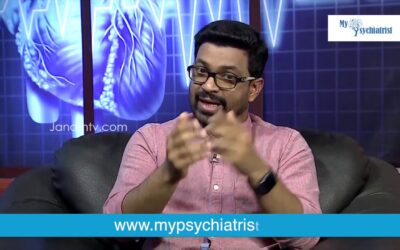Depression is a psychiatric disorder that primarily affects the mood state of a person. Unlike sadness which is a normal phenomenon, Depression is a constant state that involves all aspects of the person’s life, causing significant dysfunction.
It is a common psychiatric disorder and is often missed. According to estimates, one to two out of every ten people have depression. In India, depression has been found to be more common (almost double) in cities compared to villages and in women compared to men. It commonly affects between aged 20 to 40 years, but older adults, teens, and children can also be affected. Suicide rates in people with depression are very high; between 2–7%.
Depression is believed to be caused by a combination of heredity, psychological stress, biological factors (hormonal changes due to pregnancy and menstruation in women). If you have a relative with depression, use addictive substances, or have longstanding health problems, you are at a higher risk of developing depression. Having had a previous episode of depression also puts you at a greater risk for having another episode. Depression may be triggered by and incident or event in your life such as loss of a loved person (death, divorce or separation), shifting of residence or job, retirement, personal conflicts, physical, emotional or sexual abuse.
The main symptoms of depression are a constant feeling of sadness or inability to feel happiness, feeling tired and without energy all the time, and changes in sleep pattern, appetite or weight, and sexual activities. Sometimes, instead of sadness, there may be irritability and anger outbursts. There may also be difficulties in concentration, taking decisions, negative thoughts of helplessness, hopelessness, worthlessness, guilt, suicidal thoughts and anxiety. Sometimes, one can also have bodily symptoms like unexplained aches and pains, digestive discomfort, headaches etc. If symptoms are severe one may find it difficult to work, study, sleep, eat, and enjoy activities.
Depressed children may often be irritable and cranky rather than sad and withdrawn. They may lose interest in school and show a decline in academic performance, become clingy, demanding, dependent, or insecure.
In elderly people, especially those who have had a stroke or are otherwise bedridden, the symptoms may not be as obvious as in others.
The symptoms of depression need to last continuously for at least 2 weeks before a psychiatric diagnosis can be made. Exceptions to this time frame are made in people who have already had previous episodes. An episode can last for 6months or more if left untreated. Some people have depression only once in their life, while others may have repeated episodes.
Before making a diagnosis of depression, your doctor may ask you to get some tests done to rule out certain medical conditions that cause symptoms similar to depression, these include thyroid related disorders, disorders related to use of addictive substances, anaemia etc.
Depression can be treated using medications and counselling or psychotherapy. Based on each person’s condition, and severity of the illness, your doctor may choose to either treat you with psychotherapy alone, medications alone or a combination of both. Antidepressant medications generally regulate the levels of certain chemicals in the brain (serotonin and norepinephrine) to bring about improvements. Based on the kind of symptoms a person has, and associated medical conditions, the doctor will decide which particular antidepressant will suit you best. Antidepressants are started at small doses initially and built up over a few days or weeks to their final dosage which then needs to be continued for an extended period of time. It usually takes about 4 to 6 weeks for the antidepressant medications to exert their effect. How long you will be required to continue the medications would be determined by a combination of factors that include the severity of illness, whether you have had a previous episode of depression, and the presence of ongoing stressors in your life. In certain severe conditions a kind of treatment known as electroconvulsive therapy (ECT) or shock treatment can be highly effective. ECT is usually performed twice or thrice a week initially for about 6 to 10 sessions based on improvements, by which time antidepressant medications would have started acting.
As previously mentioned, once you have a depressive episode, it puts you at a lifetime risk of another episode. Hence, it is important that you are equipped with adequate understanding of the symptoms associated with depression and thus seek help whenever you have symptoms so that treatments can be started at an earlier stage to reduce recovery periods. It is also important to develop healthy coping mechanisms and sleep habits in addition to exerting caution regarding the use of addictive substances including alcohol and nicotine (cigarettes, paan). In addition to triggering depressive episodes, it has been found that those with depression are more prone to develop addiction to such substances.
Identifying and treating depression is important to prevent suicides and to ensure optimal performance in emotional, social, and occupational spheres of life.



0 Comments